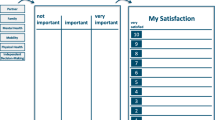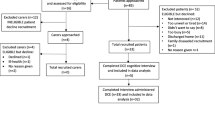ABSTRACT
BACKGROUND
Prognosis is critical in individualizing care for older adults with late life disability. Evidence suggests that preferences for prognostic information may be culturally determined. Yet little is known about the preferences of diverse elders for discussing prognosis.
OBJECTIVE
To determine the preferences for discussing prognosis of a diverse sample of older adults with late-life disability
DESIGN & PARTICIPANTS
We interviewed 60 older adults with mean age 78 and mean 2.5 Activities of Daily Living dependencies. Participants were recruited from San Francisco’s On Lok program, the first Program of All-inclusive Care for the Elderly (PACE). Participants were interviewed in English, Spanish, and Cantonese, and responded to scenarios in which their doctors estimated they had 5 years and 1 year left to live. Open-ended questions explored the reasons for their responses. Results were analyzed qualitatively using grounded theory.
KEY RESULTS
Sixty-five percent of participants wanted to discuss the prognosis if their doctor estimated they had <5 years to live and 75% if the estimate was <1 year. Three themes were prominent among patients who wanted to discuss prognosis: to prepare, to make the most of the life they had left, and to make medical or health-related decisions. Those who preferred not to discuss prognosis described emotional difficulty, the uncertainty of prognosis, or that it would not be useful. Nearly all participants said that doctors should not make assumptions based on race or ethnicity, though differences between ethnic groups emerged.
CONCLUSIONS
Most patients in this diverse sample of disabled elders were interested in discussing prognosis, while a substantial minority was not. Among those participants who preferred to discuss prognosis, many said that prognostic information would be important as they made difficult medical and personal decisions in late-life. Clinicians should inquire about preferences for discussing prognosis before sharing prognostic estimates.
Similar content being viewed by others
References
Carey EC, Covinsky KE, Lui LY, Eng C, Sands LP, Walter LC. Prediction of mortality in community-living frail elderly people with long-term care needs. J. Am. Geriatr. Soc. 2008;56(1):68–75.
Carey EC, Walter LC, Lindquist K, Covinsky KE. Development and validation of a functional morbidity index to predict mortality in community-dwelling elders. J. Gen. Intern. Med. 2004;19(10):1027–1033.
Covinsky KE, Justice AC, Rosenthal GE, Palmer RM, Landefeld CS. Measuring prognosis and case mix in hospitalized elders. The importance of functional status. J Gen Intern Med. Apr. 1997;12(4):203–208.
Fried LP, Kronmal RA, Newman AB, et al. Risk factors for 5-year mortality in older adults: the Cardiovascular Health Study. JAMA. 1998;279(8):585–592.
Inouye SK, Peduzzi PN, Robison JT, Hughes JS, Horwitz RI, Concato J. Importance of functional measures in predicting mortality among older hospitalized patients. JAMA. 1998;279(15):1187–1193.
Saliba D, Elliott M, Rubenstein LZ, et al. The Vulnerable Elders Survey: a tool for identifying vulnerable older people in the community. J. Am. Geriatr. Soc. 2001;49(12):1691–1699.
Walter LC, Brand RJ, Counsell SR, et al. Development and validation of a prognostic index for 1-year mortality in older adults after hospitalization. JAMA. 2001;285(23):2987–2994.
American Geriatrics Society Clinical Practice Committee. Breast cancer screening in older women. J. Am. Geriatr. Soc. 2000;48(7):842–844.
Screening for breast cancer: recommendations and rationale. Ann Intern Med. Sep 3 2002;137(5 Part 1):344–346.
Berg AO. Screening for colorectal cancer: recommendations and rationale. Am. J. Nurs. 2002;102(9):107–117.
Holmes HM, Hayley DC, Alexander GC, Sachs GA. Reconsidering medication appropriateness for patients late in life. Arch. Intern. Med. 2006;166(6):605–609.
Lee SJ, Lindquist K, Segal MR, Covinsky KE. Development and validation of a prognostic index for 4-year mortality in older adults. JAMA. 2006;295(7):801–808.
Walter LC, Covinsky KE. Cancer screening in elderly patients: a framework for individualized decision making. JAMA. 2001;285(21):2750–2756.
Fried TR, Tinetti ME, Towle V, O'Leary JR, Iannone L. Effects of benefits and harms on older persons' willingness to take medication for primary cardiovascular prevention. Arch. Intern. Med. 2011;171(10):923–928.
Butow PN, Maclean M, Dunn SM, Tattersall MH, Boyer MJ. The dynamics of change: cancer patients' preferences for information, involvement and support. Ann. Oncol. 1997;8(9):857–863.
Bradley EH, Hallemeier AG, Fried TR, et al. Documentation of discussions about prognosis with terminally ill patients. Am. J. Med. 2001;111(3):218–223.
Clayton JM, Butow PN, Tattersall MH. When and how to initiate discussion about prognosis and end-of-life issues with terminally ill patients. J. Pain Symptom Manage. 2005;30(2):132–144.
Fallowfield LJ, Jenkins VA, Beveridge HA. Truth may hurt but deceit hurts more: communication in palliative care. Palliat. Med. 2002;16(4):297–303.
Jenkins V, Fallowfield L, Saul J. Information needs of patients with cancer: results from a large study in UK cancer centres. Br. J. Cancer. 2001;84(1):48–51.
Yeo G. How will the U. healthcare system meet the challenge of the ethnogeriatric imperative. J. Am. Geriatr. Soc. 2009;57(7):1278–1285.
Morrison RS, Meier DE. High rates of advance care planning in New York City's elderly population. Arch Intern Med. 2004;164(22):2421–2426.
Fried TR, Bradley EH, O'Leary J. Prognosis communication in serious illness: perceptions of older patients, caregivers, and clinicians. J. Am. Geriatr. Soc. 2003;51(10):1398–1403.
Huang X, Butow P, Meiser B, Goldstein D. Attitudes and information needs of Chinese migrant cancer patients and their relatives. Aust. N. Z. J. Med. 1999;29(2):207–213.
Orona CJ, Koenig BA, Davis AJ. Cultural aspects of nondisclosure. Camb. Q. Healthc. Ethics. 1994;3(3):338–346.
Jiang Y, Liu C, Li JY, et al. Different attitudes of Chinese patients and their families toward truth telling of different stages of cancer. Psychooncology. 2007;16(10):928–936.
Yun YH, Kwon YC, Lee MK, et al. Experiences and attitudes of patients with terminal cancer and their family caregivers toward the disclosure of terminal illness. J. Clin. Oncol. 2010;28(11):1950–1957.
Cohen MJ, McCannon JB, Edgman-Levitan S, Kormos WA. Exploring attitudes toward advance care directives in two diverse settings. J. Palliat. Med. 2010;13(12):1427–1432.
Perkins HS, Geppert CM, Gonzales A, Cortez JD, Hazuda HP. Cross-cultural similarities and differences in attitudes about advance care planning. J. Gen. Intern. Med. 2002;17(1):48–57.
Elkin EB, Kim SH, Casper ES, Kissane DW, Schrag D. Desire for information and involvement in treatment decisions: elderly cancer patients' preferences and their physicians' perceptions. J. Clin. Oncol. 2007;25(33):5275–5280.
Wenrich MD, Curtis JR, Ambrozy DA, Carline JD, Shannon SE, Ramsey PG. Dying patients' need for emotional support and personalized care from physicians: perspectives of patients with terminal illness, families, and health care providers. J. Pain Symptom Manage. 2003;25(3):236–246.
Eng C, Pedulla J, Eleazer GP, McCann R, Fox N. Program of All-inclusive Care for the Elderly (PACE): an innovative model of integrated geriatric care and financing. J. Am. Geriatr. Soc. 1997;45(2):223–232.
Glaser B, Strauss A. Discovery of Grounded Theory. Strategies for Qualitative Research: Sociology Press, 1967.
Strauss A, Corbin J. Basics of Qualitative Research. Thousand Oaks. CA: Sage; 1998.
Sandelowski M. Sample size in qualitative research. Res. Nurs. Health. 1995;18(2):179–183.
Kaplowitz SA, Campo S, Chiu WT. Cancer patients' desires for communication of prognosis information. Health Commun. 2002;14(2):221–241.
Christakis NA, Iwashyna TJ. Attitude and self-reported practice regarding prognostication in a national sample of internists. Arch. Intern. Med. 1998;158(21):2389–2395.
Curtis JR, Patrick DL, Caldwell ES, Collier AC. Why don't patients and physicians talk about end-of-life care? Barriers to communication for patients with acquired immunodeficiency syndrome and their primary care clinicians. Arch. Intern. Med. 2000;160(11):1690–1696.
Lamont EB, Christakis NA. Prognostic disclosure to patients with cancer near the end of life. Ann. Intern. Med. 2001;134(12):1096–1105.
Blackhall LJ, Murphy ST, Frank G, Michel V, Azen S. Ethnicity and attitudes toward patient autonomy. JAMA. 1995;274(10):820–825.
Kelley AS, Wenger NS, Sarkisian CA. Opiniones: end-of-life care preferences and planning of older Latinos. J. Am. Geriatr. Soc. 2010;58(6):1109–1116.
Blackhall LJ, Frank G, Murphy S, Michel V. Bioethics in a different tongue: the case of truth-telling. J. Urban Health. 2001;78(1):59–71.
Mitchell JL. Cross-cultural issues in the disclosure of cancer. Cancer Pract. 1998;6(3):153–160.
Acknowledgements
All authors included in this manuscript have contributed sufficiently to the project to be included as authors. Every person who contributed to the writing of this manuscript is listed as an author.
Funders
Dr. Smith was supported by a pilot grant from the Center for Aging in Diverse Communities, grant no. P30-AG15272 of the Resource Centers for Minority Aging Research program funded by the National Institute on Aging, National Institutes of Health. Additional support was provided by the National Center for Research Resources UCSF-CTSI (UL1 RR024131), Atlantic Philanthropies, the Society of General Internal Medicine, the John A. Hartford Foundation, and the Association of Specialty Professors.
Prior Presentations
This paper has not been previously presented.
Conflicts of Interest
None disclosed.
Author information
Authors and Affiliations
Corresponding author
Electronic supplementary material
Below is the link to the electronic supplementary material.
ESM 1
(DOC 26 kb)
Rights and permissions
About this article
Cite this article
Ahalt, C., Walter, L.C., Yourman, L. et al. “Knowing is Better”: Preferences of Diverse Older Adults for Discussing Prognosis. J GEN INTERN MED 27, 568–575 (2012). https://doi.org/10.1007/s11606-011-1933-0
Received:
Revised:
Accepted:
Published:
Issue Date:
DOI: https://doi.org/10.1007/s11606-011-1933-0




